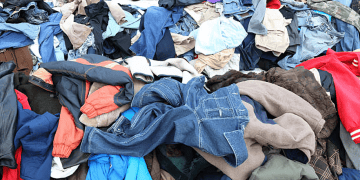As more people in cities buy trendy clothes frequently, the amount of clothing produced and thrown away globally is increasing rapidly. Studies show that around 80 to 150 billion clothing items are made each year, which translates to about 10 to 19 pieces for every person on Earth. This means people are buying 60% more clothes today than they did 15 years ago, but they’re keeping each item for only half as long. With the rise of fast fashion, these numbers are probably even worse now compared to what they were in 2016.
This growing trend has serious environmental effects. Making clothes requires a lot of water—just one cotton shirt uses about 2,700 liters (or 713 gallons) of water, which could satisfy a person’s drinking needs for over two and a half years. The fashion industry’s water use is only second to agriculture, which harms the environment significantly.
The production of fibers, including those used for clothing and home textiles, has hit all-time highs. While natural fibers like wool and cotton are still popular, synthetic fibers, notably polyester, are becoming the most used. In 2023, around 70 million metric tons of polyester were produced, making up 57% of all fiber production. Unfortunately, most of this polyester—about 87.5%—is new and made from fossil fuels, which adds to greenhouse gas emissions from the fashion industry. As of 2018, this industry was responsible for nearly 10% of global carbon emissions, and if current patterns continue, that number could rise to 26% by 2050.
The effects of all this textile production extend beyond just making clothes. Wealthy cities around the globe are now feeling the pressure from all this excess clothing consumption. The increase in textile waste has led to stuffed charity shops, overflowing donation bins, and heaps of discarded clothes in landfills. A lot of these garments are sent to overseas markets, especially in poorer countries, which can make their waste management problems even worse.
A significant study by RMIT researcher Dr. Yassie Samie and her team looked at what happens to used clothing in nine wealthy cities: Amsterdam, Austin, Berlin, Geneva, Luxembourg, Manchester, Melbourne, Oslo, and Toronto. The results showed that most used clothing collection is managed by charities and resellers rather than city governments. While charities help collect these clothes, they are struggling with a growing number of low-quality donations. For example, in Geneva, donations to charity shops have increased by 1,200% over the last 30 years, with 3,000 metric tons received just in 2021.
The size of textile waste issues is further complicated by the fact that a lot of donated clothing is exported. In Oslo, nearly 97% of donated clothes are sent to other countries, while in Luxembourg, only about 3-4% are sold or given out locally. This practice is criticized as “waste colonialism,” where richer countries are passing their waste problems onto poorer nations, which in turn harms the environment.
Dr. Samie emphasizes the need to tackle this issue urgently, especially if cities want to meet their climate goals. To make meaningful changes, we need to rethink how we use and manage textiles. She supports the Circular Economy 3.0 model, which encourages delaying waste by increasing how long products last. This approach involves buying less, reselling, repairing, and creatively reusing materials to reduce the need for new items.
In places like Australia, where people buy an average of 56 new clothing items a year, even more charity donations and second-hand sales are not enough to deal with the growing waste. Samie believes cities could help by adding more second-hand shops, repair places, and clothing swap events in popular areas like shopping centers.
On the policy side, Samie is hopeful that recent changes in Europe will lead to wider improvements. Starting in 2025, all EU countries must set up special services to collect used textiles, which will help keep them separate from other waste. This rule is expected to support recycling and offer better insights into how much textile waste is being produced. Additionally, countries like France are trying to limit fast fashion by proposing bans on its advertising and imposing taxes on these types of items.
Despite these promising steps, Samie warns that time is running out. As ultra-fast fashion ramps up production, the gap between creating waste and managing it grows. Dr. Samie urges governments, businesses, and individuals to take quick action to cut down on consumption and adopt more sustainable practices before it’s too late.
Your go-to for supply chain report news updates: The Supply Chain Report. For international trade tools, see ADAMftd.com.
#FastFashion #SustainableFashion #TextileWaste #CircularEconomy #ClothingWaste #FastFashionImpact #TextileRecycling #SustainableLiving #EcoFriendlyFashion #GreenFashion #FashionIndustry #EnvironmentalImpact #SecondHandClothing #TextilePollution #SustainableConsumption #FashionRevolution #WasteColonialism #SustainabilityMatters #ClimateGoals #RecyclingTextiles #RepairAndReuse















